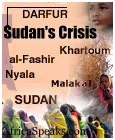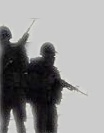 |






 AfricaSpeaks Weblog AfricaSpeaks Weblog
 Rootswomen Weblog Rootswomen Weblog
 Rootsie's Weblog Rootsie's Weblog
|
When is a war not a war?
Posted: Tuesday, July 2, 2002
by Brendan O'Neill, Spiked Jan 29, 2002
So are the al-Qaeda and Taliban fighters imprisoned at Camp X-Ray in Cuba 'ordinary prisoners', 'prisoners of war', 'detainees', 'internees' or 'unlawful combatants'? Don't ask the US authorities.
According to defence secretary Donald Rumsfeld, 'there is no ambiguity in this case, they are not POWs' (1) - although secretary of state Colin Powell reportedly reckons 'the detainees should be regarded as prisoners of war, at least until they have appeared in front of a hearing' (2). President Bush says 'we are not going to call them prisoners of war' (3), though he is reported to be 'discussing what legal provisions of the Geneva Conventions may apply to the detainees' (4). And according to one report, 'Mr Bush did refer to the men as "prisoners", but then corrected himself and called them "detainees"' (5).
The US authorities' defensiveness about the status and treatment of the Camp X-Ray prisoners is a snapshot of their confused and directionless 'war against terror'. Asked about the debate over the 'detainees' (the one term they all agree on), defence spokeswoman Victoria Clarke said, 'we're in very unconventional times, we're in a very unconventional war. So every aspect of it…should be looked at with new eyes' (6). She's right that this war is 'unconventional' - and it's hardly surprising that a war with ever-shifting aims and no end in sight should have difficulty deciding whether its prisoners are prisoners.
The Bush administration has been lambasted by the Red Cross, Amnesty International, liberal commentators and European governments for its treatment of the men at Camp X-Ray - for shackling and sedating them on their long-haul flights, keeping them in outdoor cages, and disrespecting their spiritual beliefs by shaving off their beards. As Jon Holbrook points out elsewhere on spiked, such complaints about Camp X-Ray are often politically driven and problematic (7). But the problem for the USA is that, having done much to create the notion of humanitarian warfare over the past 10 years - war that cares as well as kills - it now finds the human rights agenda biting at its heels.
Some right-wing US commentators have tried to pin the blame for humanitarianism in all affairs foreign on Bush's bleeding-heart predecessor Bill Clinton, with his Operation Restore Hopes and his quivering lower lip. But Bush has done his fair share to further the humanitarian agenda. When the USA started its war in Afghanistan in October 2001, Bush announced that 37,500 food parcels would be dropped alongside the bombs, so that 'the oppressed people of Afghanistan will know the generosity of America and our allies' - showing that from the outset, Bush was keen to play by the humanitarian rules (8). A president who made a big issue of dropping 'not just bombs, but bread' with references to 'his friends, the Afghan people' shouldn't be surprised if there's a backlash when he tries a get-tough, no-BS policy on prisoners.
The USA has at least won the battle of the bank balances
But if the men at Camp X-Ray are not prisoners of war, maybe the 'war against terrorism' is not a war? In recent weeks, US leaders have moved away from describing their actions in Afghanistan from a 'war' to a 'campaign'. According to one US senator, the 'campaign to help the Afghans continues', as if this what the war/non-war was always about (9) - while even defence secretary Rumsfeld, the Bush administration's hardliner who has no interest in nation-building in Afghanistan and every interest in fighting a war, has learned to talk up the supposed humanitarian side to the 'campaign against terror' (10).
'Over the past weeks and months, a good deal of attention has been paid to the various military operations by coalition forces in Afghanistan', says Rumsfeld, '[but] it's also important to recognise the progress that has been made in some other areas' - before listing how US forces have been helping to rebuild Afghanistan: 'They're helping with hospitals. They're helping with medical assistance. They're helping with food and blankets and what have you.' (11) So what started as a war to destroy al-Qaeda for the terrorist attacks it carried out in New York and Washington is now talked about in terms of rebuilding a nation and offering humanitarian assistance on 'what have you'.
The USA's shifting war aims (should that be 'campaign aims'?) are highlighted in its list of achievements and success stories that have come out of Afghanistan over the past four months. There's the women issue, with one report celebrating the fact that 'Many female teachers [in Afghanistan] have returned to their jobs, and young women are enrolling in universities' (12). And there's the successful war on terrorist finances, with one report pointing out that 'administration officials have repeatedly stressed that a critical element of their anti-terrorism campaign is on the financial front', and 'more than $34million in American accounts has been frozen' (13).
So having failed to get bin Laden, the US authorities can at least take comfort in the fact that they have won the battle of the bank balances. And unsure whether their 'campaign' in Afghanistan has achieved its original aims (to destroy al-Qaeda), the USA can at least celebrate the return of girls to schools (in a destroyed country, with widespread poverty and no infrastructure).
But at the same time as flagging up their newly-found campaign aim of rebuilding Afghanistan, the Bush administration is keen to remind us that military operations continue with a vengeance. 'Though the public perception may be that American military operations are winding down', says the Washington Post, 'Pentagon officials make clear that isn't true' (14) - while Rumsfeld said on 27 January (three days after his 'let's celebrate the humanitarian effort' speech) that '[the military campaign] is going on today with every bit as much intensity as it was last month, the month before, and indeed every day since 11 September' (seeming to have forgotten that the military campaign started on 7 October, not 11 September) (15).
What exactly is the US army targeting now?
So the military bit of the campaign against terrorism is continuing with 'as much intensity' as ever? In an Afghanistan where the Taliban has been routed, a new interim government installed and where little girls are returning to school? What exactly is the US army targeting now?
Not very much. The bombing of caves continues unabated, in an attempt to destroy al-Qaeda's 'infrastructure' - despite protests from civilians in the Zhawar Kili region, where numerous caves have been obliterated since the start of 2002, that the bombing is killing more civilians than Taliban or al-Qaeda members. '[The bombing] was a waste of time and money', said one local resident (16) - while a key Pashtun commander in the region says, 'The Americans never contact us. They are just doing it themselves' (17). How can America expect to build up its intelligence, if it won't even go in on the ground to sound out potential allies for information and ideas?
On 25 January 2002, the Pentagon claimed that US forces had killed about 15 'relatively senior' Taliban figures and captured another 27 in Hazar Qadam in southern Afghanistan, hailed as a success story by Rumsfeld and splashed across the news in the USA and Europe. What didn't make such big headlines was the claim by local villagers that those killed were in fact anti-Taliban forces keen to assist the allied forces in finally flushing the Taliban out of Afghanistan. According to Yusuf Pashtun, an aide to Kandahar governor Gul Agha,: 'It looks like it was raided by mistake. The people of the district centre are very much against the Taliban.' (18)
Then there was the headline news that US forces had killed six al-Qaeda members in a tense stand-off - which turned out to be a case of US forces covering the advance of Afghan fighters as they tried to get six al-Qaeda fighters out of a Kandahar hospital ward that they had refused to leave for the past two months, which was 'holding up' everyday work at the hospital (19). Hardly an heroic operation.
The problem for the USA is their absolute dearth of intelligence - to the extent that they reportedly can't even tell the difference between anti-Taliban villagers and pro-Taliban forces. As for the whereabouts of al-Qaeda leader bin Laden and former Taliban leader Muhummad Omar, the Americans haven't got a clue. Omar hasn't been seen since he reportedly escaped on a motorbike from a town surrounded by US forces at the beginning of January, while bin Laden (who is now supposed to be dragging a dialysis machine around with him) could apparently be anywhere in the Middle East, Asia, Central Asia, north Africa or, at a long shot, Eastern Europe.
US forces are so low on intelligence they can’t tell one ‘towel-head’ from another
'We believe they both are alive and our best information is they are still in Afghanistan or in the area along the Pakistani border', said a senior Bush administration official on 26 January. 'But we don't know for sure.' (20) 'There are plenty of other potential leads about people', said another official. 'But we don't know what is true and what is not.' No wonder Bush could only say that America's war/campaign/mission is against the 'shadowy enemy dwelling in dark corners of the Earth' (21) - a statement that captures the USA's lack of confidence as much as it does its lack of intelligence.
According to January's New Yorker magazine, 'a US-approved evacuation of Pakistani military officers and intelligence advisers during the siege of Kunduz last November "slipped out of control" and a number of Taliban and al-Qaeda fighters joined the exodus' (22). 'Dirt got through the screen' said one senior US intelligence official (23) - his way of explaining that a number of the enemy escaped in broad daylight in full view of US soldiers. Maybe that's how bin Laden got out - under the noses of US forces so low on intelligence that they can't tell one 'towel-head' from another.
So when is a war not a war and its prisoners not prisoners? When it's a 'campaign' so lacking in intelligence and direction that its leaders spend the whole time admitting to being 'unsure' and changing their aims.
Read on:
The State of the War, by Mick Hume
They seek him - where?, by Brendan O'Neill
How did we get from Manhattan to Kabul?, by Mick Hume
spiked-issue: After 11 September
(1) US vows no POW status for detainees, San Jose Mercury News, 28 January 2002
(2 - 6) Bush hints at more legal rights for Camp X-Ray prisoners, Guardian, 29 January 2002
(7) See Spotlight on Camp X-Ray, by Jon Holbrook
(8) See More symbol than sustenance, by Josie Appleton
(9) US says war effort remains intense, Washington Post, 27 January 2002
(10 - 11) DoD News Briefing, 24 January 2002
(12 - 15) US says war effort remains intense, Washington Post, 27 January 2002
(16 - 18) US accused of killing anti-Taliban leaders, Guardian, 28 January 2002
(19) Grenades end two-month siege at Afghan hospital, Guardian, 28 January 2002
(20) US says war effort remains intense, Washington Post, 27 January 2002
(21) Big boost for military spending, BBC Online, 24 January 2002
(22 - 23) US enabled al-Qaeda fighters to flee Kunduz, Reuters, 20 January 2002
 Printer friendly version Printer friendly version
 Send page by E-Mail Send page by E-Mail
|








